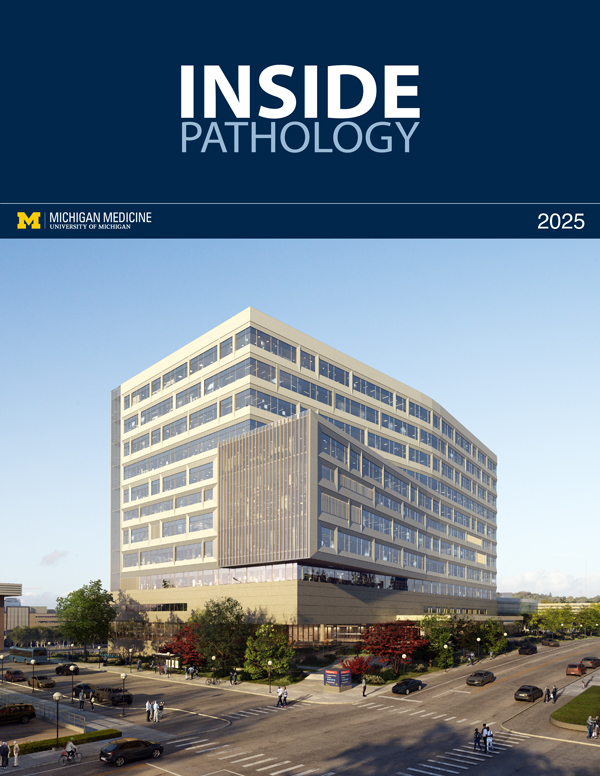

By Lauren Smith, M.D. | 12 February
When I tell people that I’m a pathologist who does clinical ethics consultations and academic work in ethics, this news is often met with surprise. It’s true that I am the only pathologist on our hospital ethics committee which consists of an interdisciplinary team of 40 individuals including physicians, social workers, nurses, genetic counselors, lawyers, trainees, and community members. However, when one takes a closer look, there are many ethical issues in pathology worthy of discussion and debate.
The Medical Ethics Path of Excellence is a co-curricular program for medical students who are interested in pursuing an interest in ethics while in medical school. The program is designed to educate the ethics committee members and consultants of the future. It is also intended for students who want to pursue academic interests in ethics. Students are exposed to medical ethics in a series of lunch time discussions, evening seminars with specialized topics, and independent study/mentoring. Field work consists of involvement with the adult and pediatric ethics committees and consultation services. In the future, involvement in a Path of Excellence will be a requirement of the new medical school curriculum rather than an elective option.
My interest in ethics began before medical school when I worked in a genetics laboratory and was involved in a study on genetic testing at the University of California, San Francisco. These were the early days of genetic discovery when sequencing was an arduous process and the genome project was in full swing. We were looking for the genetic basis of bipolar disorder, and we wanted to know if there would be interest in genetic testing for psychiatric conditions, should specific genetic associations ever be found.
I continued to be interested in ethics in medical school and joined the University of Michigan Adult Ethics Committee in 2005 as a hematopathology fellow. Our ethics committee has an active clinical ethics consultation practice dealing with ethical issues that arise in our hospital. Many of these cases involve end of life care, but there is a broad range of issues that arise. Some of these cases are directly related to pathology.
Learn More About the
Ethics Path of Excellence
I was also aware of a case in which trauma surgeons provided massive transfusion to a patient who they were sure would not survive so that family members could arrive before death to say “goodbye”. Only later did the transfusion medicine service realize that the case was medically futile.
As pathologists, we understand that blood products are a unique type of scarce resource. However, rationing is frowned upon in our current healthcare system. These types of cases made us realize that we need a hospital policy addressing the rational use of blood products in unusual circumstances, such as end of life care and in the setting of massive transfusion. In collaboration with my transfusion medicine colleagues, we published some guidelines in the journal Transfusion that may be helpful in these situations (see Smith LB, Cooling L, Davenport, R. How do I allocate blood products at the end of life? An ethical analysis with suggested guidelines. Transfusion 2013; 53:696-700.)
Ethical issues can also be found in other areas of pathology, including patient safety/reporting medical errors, second review of outside diagnoses at academic centers, the autopsy service with “saved” tissue, and the HLA laboratory when non-paternity is discovered. Many ethical dilemmas arise with whole genome sequencing studies and how to report results to patients. I recently organized a Michigan State Medical Society (MSMS) Annual Bioethics Conference that dealt specifically with the topic of ethical issues in personalized medicine. As the appointed Chair of the MSMS Bioethics Committee and Director of the Ethics Path of Excellence, a co-curricular four-year program for medical students, I am excited to continue my work in this area, exploring ethical questions related to pathology and other areas of medicine.
---
This article first appeared in Inside Pathology, 2014. Dr. Smith is an Associate Professor in the Department of Pathology, Director of the Hematopathology Fellowship Program, and recently named UMHS Hospital Ethicist.
 ON THE COVER
ON THE COVER
Breast team reviewing a patient's slide. (From left to right) Ghassan Allo, Fellow; Laura Walters, Clinical Lecturer; Celina Kleer, Professor. See Article 2014Department Chair |

newsletter
INSIDE PATHOLOGYAbout Our NewsletterInside Pathology is an newsletter published by the Chairman's Office to bring news and updates from inside the department's research and to become familiar with those leading it. It is our hope that those who read it will enjoy hearing about those new and familiar, and perhaps help in furthering our research. CONTENTS
|
 ON THE COVER
ON THE COVER
Autopsy Technician draws blood while working in the Wayne County morgue. See Article 2016Department Chair |

newsletter
INSIDE PATHOLOGYAbout Our NewsletterInside Pathology is an newsletter published by the Chairman's Office to bring news and updates from inside the department's research and to become familiar with those leading it. It is our hope that those who read it will enjoy hearing about those new and familiar, and perhaps help in furthering our research. CONTENTS
|
 ON THE COVER
ON THE COVER
Dr. Sriram Venneti, MD, PhD and Postdoctoral Fellow, Chan Chung, PhD investigate pediatric brain cancer. See Article 2017Department Chair |

newsletter
INSIDE PATHOLOGYAbout Our NewsletterInside Pathology is an newsletter published by the Chairman's Office to bring news and updates from inside the department's research and to become familiar with those leading it. It is our hope that those who read it will enjoy hearing about those new and familiar, and perhaps help in furthering our research. CONTENTS
|
 ON THE COVER
ON THE COVER
Director of the Neuropathology Fellowship, Dr. Sandra Camelo-Piragua serves on the Patient and Family Advisory Council. 2018Department Chair |

newsletter
INSIDE PATHOLOGYAbout Our NewsletterInside Pathology is an newsletter published by the Chairman's Office to bring news and updates from inside the department's research and to become familiar with those leading it. It is our hope that those who read it will enjoy hearing about those new and familiar, and perhaps help in furthering our research. CONTENTS
|
 ON THE COVER
ON THE COVER
Residents Ashley Bradt (left) and William Perry work at a multi-headed scope in our new facility. 2019Department Chair |

newsletter
INSIDE PATHOLOGYAbout Our NewsletterInside Pathology is an newsletter published by the Chairman's Office to bring news and updates from inside the department's research and to become familiar with those leading it. It is our hope that those who read it will enjoy hearing about those new and familiar, and perhaps help in furthering our research. CONTENTS
|
 ON THE COVER
ON THE COVER
Dr. Kristine Konopka (right) instructing residents while using a multi-headed microscope. 2020Department Chair |

newsletter
INSIDE PATHOLOGYAbout Our NewsletterInside Pathology is an newsletter published by the Chairman's Office to bring news and updates from inside the department's research and to become familiar with those leading it. It is our hope that those who read it will enjoy hearing about those new and familiar, and perhaps help in furthering our research. CONTENTS
|
 ON THE COVER
ON THE COVER
Patient specimens poised for COVID-19 PCR testing. 2021Department Chair |

newsletter
INSIDE PATHOLOGYAbout Our NewsletterInside Pathology is an newsletter published by the Chairman's Office to bring news and updates from inside the department's research and to become familiar with those leading it. It is our hope that those who read it will enjoy hearing about those new and familiar, and perhaps help in furthering our research. CONTENTS
|
 ON THE COVER
ON THE COVER
Dr. Pantanowitz demonstrates using machine learning in analyzing slides. 2022Department Chair |

newsletter
INSIDE PATHOLOGYAbout Our NewsletterInside Pathology is an newsletter published by the Chairman's Office to bring news and updates from inside the department's research and to become familiar with those leading it. It is our hope that those who read it will enjoy hearing about those new and familiar, and perhaps help in furthering our research. CONTENTS
|
 ON THE COVER
ON THE COVER
(Left to Right) Drs. Angela Wu, Laura Lamps, and Maria Westerhoff. 2023Department Chair |

newsletter
INSIDE PATHOLOGYAbout Our NewsletterInside Pathology is an newsletter published by the Chairman's Office to bring news and updates from inside the department's research and to become familiar with those leading it. It is our hope that those who read it will enjoy hearing about those new and familiar, and perhaps help in furthering our research. CONTENTS
|
 ON THE COVER
ON THE COVER
Illustration representing the various machines and processing used within our labs. 2024Department Chair |

newsletter
INSIDE PATHOLOGYAbout Our NewsletterInside Pathology is an newsletter published by the Chairman's Office to bring news and updates from inside the department's research and to become familiar with those leading it. It is our hope that those who read it will enjoy hearing about those new and familiar, and perhaps help in furthering our research. CONTENTS
|
 ON THE COVER
ON THE COVER
Rendering of the D. Dan and Betty Khn Health Care Pavilion. Credit: HOK 2025Department Chair |

newsletter
INSIDE PATHOLOGYAbout Our NewsletterInside Pathology is an newsletter published by the Chairman's Office to bring news and updates from inside the department's research and to become familiar with those leading it. It is our hope that those who read it will enjoy hearing about those new and familiar, and perhaps help in furthering our research. CONTENTS
|

MLabs, established in 1985, functions as a portal to provide pathologists, hospitals. and other reference laboratories access to the faculty, staff and laboratories of the University of Michigan Health System’s Department of Pathology. MLabs is a recognized leader for advanced molecular diagnostic testing, helpful consultants and exceptional customer service.